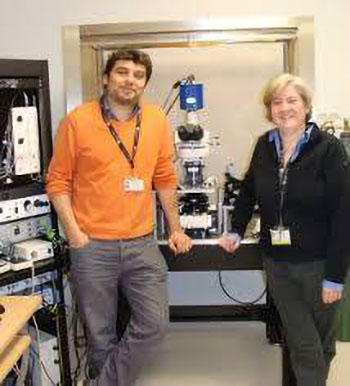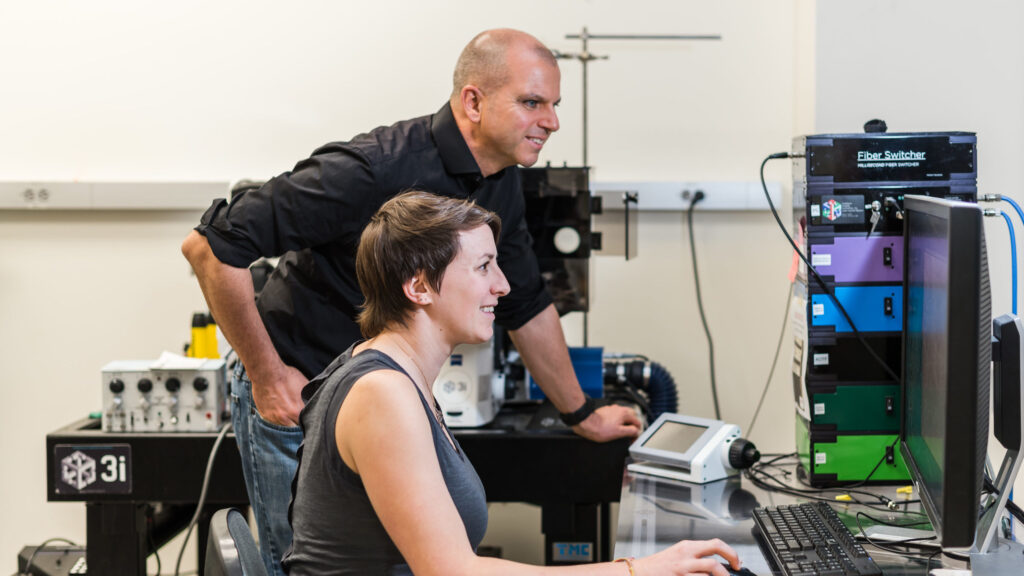Contribution of Microglia to the Therapeutic Effects of Metformin and Adiponectin in Fragile X Syndrome
Why are some with Fragile X always hungry or overweight, yet rarely diabetic? This team is studying metabolism and testing treatments like metformin and diet.
20 Years of Advancing Fragile X Research: Progress Toward a Cure
MIT Professor Mark Bear traces the discoveries that give us great optimism of finding effective treatments and ultimately a cure for Fragile X syndrome.
Brain Organoids, Moving Fragile X Research Forward
FRAXA-funded scientists at Emory created human brain organoids that reveal Fragile X changes more clearly than mouse models, opening new paths to targeted treatments.
Tetra’s Fragile X Clinical Trial – The Most Successful So Far
Dr. Mark Gurney, CEO of Tetra Therapeutics, discusses how one of the earliest clues to the biology of Fragile X led to the most successful Fragile X clinical trial to date. FRAXA and Tetra began working together after a key FRAXA-funded study caught the attention of Dr. Gurney. Through the FRAXA Drug Validation Initiative, Dr. Patricia Cogram was able to conduct preclinical validation experiments with Tetra’s lead compound in record time, paving the way for clinical trials.
Alternative Splicing in White Blood Cells: A Biomarker for Fragile X Syndrome
This team found 1,600 blood-based Fragile X biomarkers that vary by individual—opening the door to personalized treatment and better ways to measure progress.
2021 FRAXA Awards – Recognizing Perseverance and Dedication
In conjunction with World Fragile X Day 2021, FRAXA Research Foundation is proud to recognize its annual award recipients. This year’s recipients exemplify the perseverance and dedication that has made FRAXA a global leader in Fragile X research for nearly 30 years. We are fortunate to partner with these individuals on research, community support and awareness efforts.
Link Between Lipid Profile, eCBome System and Gut Microbiome in Fragile X Syndrome
Why does obesity challenge so many people with Fragile X? Dr. Caku’s team has found that Fragile X syndrome causes changes in the tiny organisms that live in our gut.
Characterization of Microglia Transcriptional Profile in Fmr1 Knockout Mice Model
Microglia are excessively activated in Fragile X models. The team will investigate the mechanisms and attempt to correct this using drugs.
The Role of Astrocyte BMP Signaling in Fragile X Syndrome
Researchers found a pathway in astrocytes that is overactive in Fragile X syndrome, and they hope to bring this pathway back to normal with a drug.
Identifying Cellular and Molecular Signatures in Human Neurons That Distinguish Fragile X Syndrome Patients with Divergent EEG Profiles
Just as Fragile X affects individuals differently, medications do as well. This project aims to bring personalized medicine to Fragile X syndrome.
Drug Tolerance in MGluR5 Clinical Trials – Dr Patrick McCamphill 1:1 with FRAXA
We have long suspected that the clinical trials of mGluR5 blockers from Novartis and Roche failed because the drug triggered tolerance, losing effect over time. With a $90,000 grant from FRAXA, Dr. Patrick McCamphill, a Postdoctoral Fellow in the MIT lab of Dr. Mark Bear, is investigating. He does indeed find tolerance, and now he is looking for ways to overcome it.
Pharmacotherapeutic Effects of Cannabidiol (CBD) in Fragile X syndrome (FXS) and Autism Spectrum disorder (ASD)
This study tested CBD (cannabidiol) treatment in male and female Fragile X mice to learn how and why it works and whether gender affects responses to CDB treatment.
Cellular-Specific Therapeutic Targeting of Inhibitory Circuits in Fragile X Syndrome
The team studied how inhibitory brain circuits malfunction in Fragile X and tested ways to restore balance by targeting mGluR and endocannabinoid signaling.
Auditory Dysfunction in Fragile X Syndrome in a Mouse Model of Fragile X
FRAXA-funded studies found Fragile X mice show altered auditory circuit function with delayed startle timing and reduced prepulse inhibition, mirroring human sound sensitivity.
Clinical Trials and Cyclic AMP in Fragile X Syndrome: A Life Journey
In November 2020, a phase II clinical trial reported extremely successful results. This clinical trial of a PDE4D inhibitor from Tetra Pharmaceuticals was conducted by Dr. Elizabeth Berry-Kravis at Rush University Medical Center and funded by FRAXA Research Foundation. In this Simons Foundation lecture, Elizabeth Berry-Kravis traces 30 years of Fragile X research, from identifying its cause, through finding dozens of treatment targets, through a series of disappointing clinical trials.
Parkinson’s Therapy May Hold Promise for Fragile X
A study funded by FRAXA in Italy has encouraging results for people with Fragile X: drugs that block adenosine receptors (A2A) reversed signs of Fragile X in a mouse model.
"One of the most intriguing things about this study is that it points to an entire drug class (not just the one drug used) as potentially therapeutic for Fragile X. Many available compounds block A2A receptors, and we know they are safe and effective.
Beneath the Surface of Fragile X Syndrome: Study Sheds Light on What’s Happening in Nerve Cells
This FRAXA-funded project has turned up some surprising results. At first, it might seem Kurosaki and Maquat have found yet another cellular process which is malfunctioning in Fragile X. But this finding is intimately related to previous findings of abnormal protein synthesis and misregulated transcription in Fragile X. FMRP (the protein lacking in Fragile X syndrome) is involved in chaperoning messenger RNAs within cells to active sites, and in controlling their translation into many different proteins. Some of these proteins are transcription factors, which feed back to the nucleus to control gene expression.
Integrating Human and Mouse Studies in Fragile X Syndrome – an NIH Center Approach
Presentations by Craig Erickson, Ernest Pedapati, Devin Binder, and Kimberly Huber about their research on Fragile X as part of their NIH Center of Excellence.
Developing Arbaclofen for Fragile X – Dr. Mark Bear 1:1 with FRAXA
Seven years ago, arbaclofen (STX209) was pulled from development, disappointing families around the US. Now MIT professor and FRAXA Investigator Dr. Mark Bear has founded Allos Pharma to bring it back. Dr. Bear sat down with FRAXA co-founder Katie Clapp to share the story and next steps.
Towards Understanding the Role of FMRP in Human Brain Development Using Brain Organoids
Dr. Zhexing Wen and Dr. Peng Jin of the newly funded Fragile X Center of Excellence at Emory University School of Medicine join us in this seminar to present about Understanding the Role of FMRP in Human Brain Development Using Brain Organoids.
Allos Pharma Revives Arbaclofen After 7 Years: New Hope for Fragile X Syndrome
Experience the revival of arbaclofen as Allos Pharma Inc launches a new development program, providing renewed hope for the Fragile X community. Discover the impact of this experimental drug and the determination of those who never gave up.
Positive Results Reported in Phase II Fragile X Clinical Trial of PDE4D Inhibitor Zatolmilast from Tetra Therapeutics
Today, Tetra Therapeutics announces the first unequivocally positive phase 2 clinical trial in Fragile X syndrome, press release below. The results do not depend on carving out a subset of patients or post hoc analysis.
Use of EEG as a Biomarker for Diagnosis and Outcomes in Neurodevelopmental Disorders
A series webinars focused on current topics in Fragile X research featuring Charles A. Nelson III, PhD, Professor at Harvard Medical School and Carol Wilkinson, MD, PhD, Instructor at Boston Children’s Hospital.
























